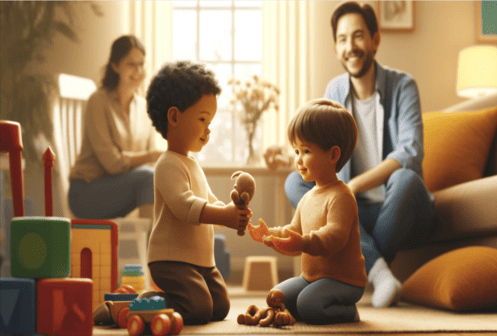Teaching children how to interact kindly, respectfully, and cooperatively with others is one of the most important parts of parenting. Social skills help children build friendships, navigate conflict, work in teams, and thrive in both school and life.
In this article, we’ll explore practical ways to encourage positive social behavior in young children—starting at home, where all great habits begin.
Why Social Skills Matter
Social behavior isn’t just about being polite—it’s about:
- Building empathy and respect for others
- Learning to communicate clearly and kindly
- Solving conflicts peacefully
- Developing emotional intelligence
- Creating healthy relationships
Children who learn these skills early are more confident, cooperative, and resilient.
Be a Role Model
Children learn most by watching. Show them how to treat others by:
- Saying “please” and “thank you”
- Apologizing when needed
- Listening without interrupting
- Using respectful language
- Showing empathy in everyday situations
Your behavior teaches them far more than your words.
Praise Positive Interactions
Catch your child doing something kind or cooperative and point it out:
- “You shared your toy so nicely. That was very generous.”
- “I noticed you waited your turn. That was respectful.”
- “You helped your sister feel better—how thoughtful!”
Praise encourages repetition and builds confidence in their social skills.
Practice Turn-Taking and Sharing
Turn-taking is a core part of cooperation and fairness. You can teach this through:
- Board games
- Role-playing scenarios
- Shared chores
- Storytime with “your turn” and “my turn” cues
Be patient—it’s a process, especially for toddlers. Celebrate effort, not just success.
Teach Problem-Solving Skills
When conflict happens (and it will), guide your child through solving it:
- Calm down first
- Listen to the other person
- Say how you feel
- Think of a fair solution together
Instead of stepping in and solving it for them, help them learn to think through social challenges.
Talk About Feelings Often
Emotional literacy supports better social behavior. Help your child:
- Identify their emotions: “Are you feeling angry or sad?”
- Express them in safe ways: “You can say, ‘I don’t like that.’”
- Recognize others’ emotions: “Look at her face—she seems upset.”
Understanding feelings is key to empathy.
Set Clear Expectations
Make sure your child knows what respectful behavior looks like:
- “In our family, we use kind words.”
- “We don’t interrupt when someone is speaking.”
- “It’s okay to be upset, but we don’t hit.”
Repeat often, especially in early childhood, and gently reinforce with reminders when needed.
Provide Social Opportunities
Children learn best by practicing. Offer chances for your child to interact with others:
- Playdates
- Group classes or sports
- Family gatherings
- Storytime or library visits
Afterward, talk about what went well and what was challenging.
Use Books and Stories
Stories are great for exploring social situations. Choose books that focus on:
- Friendship
- Kindness
- Teamwork
- Dealing with emotions
- Conflict resolution
Ask questions like:
- “How do you think the character felt?”
- “What would you do if that happened to you?”
Be Patient and Supportive
Social skills take time. Expect setbacks, big emotions, and learning curves.
- Stay calm and encouraging
- Acknowledge growth
- Celebrate small wins
With love and consistent guidance, your child will develop the tools they need to thrive socially.
Final Thoughts: Connection Creates Character
Encouraging positive social behavior isn’t about perfect manners—it’s about creating connection, empathy, and respect.
When you guide your child with kindness, model good behavior, and provide opportunities to grow, you’re shaping a person who can build strong relationships—and make the world a little kinder, one small interaction at a time.
